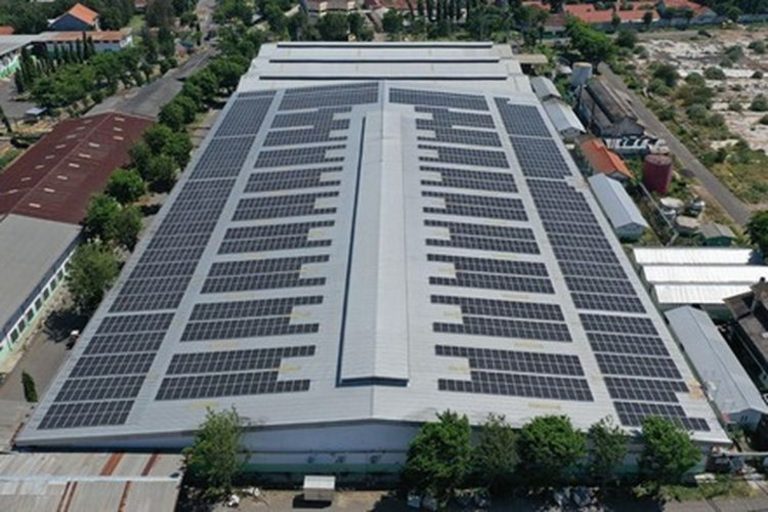
Jakarta – Sixty percent of the 587 GigaWatt (GW) new and renewable energy generating capacity originates from solar energy, making it the cornerstone of national electricity supply, officials said Tuesday (19/4).
“To achieve net zero emission by 2060, solar energy will play an important role in national electricity supply,” said Secretary General of the Ministry of Energy and Mineral Resources (ESDM), Ego Syahrial at the Indonesia Solar Summit 2022 event organised by the Ministry of Energy and Mineral Resources (ESDM) in collaboration with the Institute for Essential Services Reform (IESR).
He said, the potential for solar power generation (PLTS) reaches 3,400 GW. Currently, the government has three major programs in solar energy use, namely rooftop solar power, large-scale ground-mounted PLTS, and floating PLTS. The implementation of these programs requires contributions from many stakeholders, including the government, business permit holders, and renewable energy developers, and also energy users, such as the commercial and industrial sectors.
“Commitments to realise 2.3 GW of PLTS projects in 2022 and 2023 were declared by 31 companies, and plans to build a PLTS supporting component factory in Indonesia give optimism for solar energy investment in Indonesia,” Syahrial added.
He said rooftop PLTS can serve as quick wins in accelerating the use of solar energy through direct contributions from energy users, especially for industry to meet increasingly strong market demands for green products.
The support from local manufacturers is also very much needed to meet the level of domestic components and provide great benefits, especially in terms of job creation. “Besides that, aspects of convenience, access to cheap financing, incentives, and other financing facilities are very important to provide financial feasibility and increase investment in renewable energy such as PLTS,” said Syahrial.
Solar power accelerates green development
Michael R Bloomberg, Founder of Bloomberg LP and Bloomberg Philanthropies and United Nations Special Envoy for Climate Ambition and Solutions, emphasised the importance of switching to renewable energy as one of the right solutions in achieving zero emissions. He said, higher investment in solar energy will accelerate the development of a stronger green economy.
“Indonesia has the potential to become a global leader in solar power. The Indonesia Solar Summit is an important opportunity to showcase and accelerate Indonesia’s clean energy efforts, before the leaders of the G20 member countries arrive in Bali this November,” he said.
Currently, solar power generation is cheaper than steam power plants in many countries. The more we do to accelerate solar investment, he continued, the faster we can reduce emissions, create new jobs, and build a stronger and more resilient global economy.
In 2021, IESR identified a number of large-scale PV mini-grid project pipelines totaling 2.7 GWac, with an investment value of 3 billion USD. At the ISS 2022 performance, the number of PLTS project pipelines until 2023 is 2,300 MW which includes rooftop PLTS (the largest percentage), above ground PLTS, and floating PLTS.
To mobilise this investment potential, an attractive and supportive ecosystem is needed, including good policies and regulations, comprehensive implementation of existing regulations, and support to encourage the development of the PV mini-grid industry supply chain in Indonesia.
Fabby Tumiwa, Executive Director of IESR stated that to achieve the renewable energy target of 23% by 2025 according to Presidential Regulation 22/2017, in addition to the RUPTL target of 10.9 GW, additional renewable energy generating capacity of around 4 GW is needed outside of PLN. This addition can be contributed by PLTS, both rooftop PLTS and the use of PLTS in non-PLN business areas.
“From the declaration of the 2.3 GW PLTS project at ISS 2022, it shows the enormous potential of solar energy in Indonesia. Indonesia can become a solar power house in Southeast Asia with the potential for growth of 3-4 GW per year if not prevented. This opens up opportunities for green investment to flow, opportunities to grow the integrated solar power industry from upstream to downstream, and employment and the impetus for post-COVID economic recovery. President Jokowi needs to see this potential and lead the solar energy revolution for the energy transition in Indonesia,” said Tumiwa. (Hartatik)














